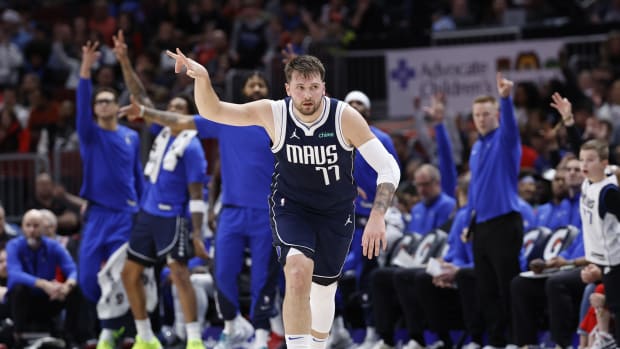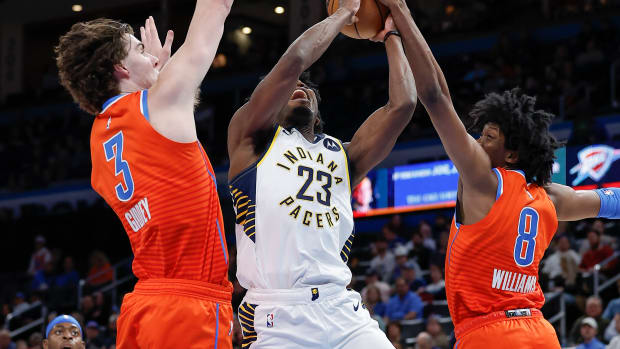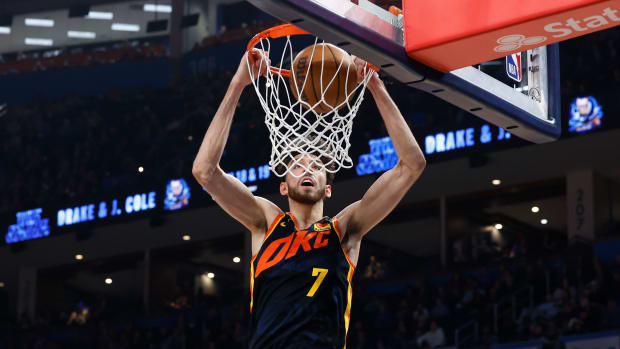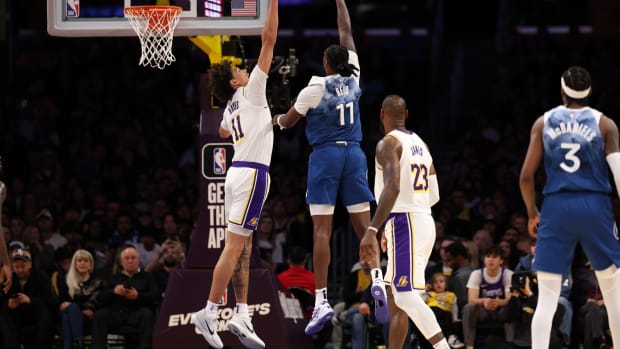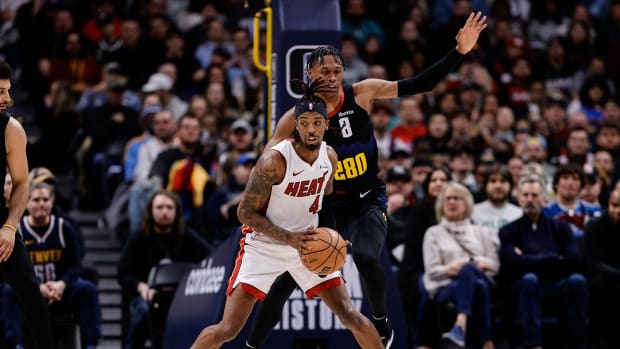Anthony Davis Deserves the Lakers’ Best Trade Offer
There was really only one conceivable way that the Pelicans would entertain the thought of trading Anthony Davis this season, and it has arrived to the sound of sirens around the league. Rich Paul, according to ESPN.com’s Adrian Wojnarowski, has informed the Pelicans that Davis will not be signing an extension with the team and has requested a trade on his behalf.
Even before the Pelicans’ season had met this particular end, the vultures were already circling overhead, their juiciest trade offers clutched in their talons. The Lakers will need theirs, too. This is the opportunity they’ve been waiting for. A franchise might be able to talk itself out of trading its best young players for Paul George or Kawhi Leonard within a year of their free agency. Davis is different. There are stars, and then there is whatever nebula-eating force of gravity and matter you’d consider Davis to be. Players like this do not come available often—it took Davis seven years, even with trade rumors whispered all the while—and there is no time for the Lakers like the present.
NADKARNI: Is Anthony Davis Forcing His Way to the Lakers?
If the Pelicans aren’t able to strike a deal for Davis by the trade deadline on Feb. 7, the entire negotiation changes. Thanks to a quirk of contract arcana, Davis and Boston’s Kyrie Irving aren’t allowed to be on the same roster under their current contracts, both of which were signed under the NBA’s designated player rules (also known as the”Rose rule”). Once Irving’s contract expires at the end of this season, so, too, does the conflict. If the Celtics are resolved to win a bid for Davis, they likely will. They simply have too many picks and permutations for any other team—the Lakers included—to feel remotely secure in their offer. Boston has gone to great lengths to signal Jayson Tatum as untouchable, which, if anything, only sets him up to be that much more of a potential trump card.
If the Lakers let the negotiation drag on to that point—past the deadline and into the offseason—they will likely lose out on a generational talent. They still might anyway. Damn near every team will explore its options to acquire Davis, with most engaging the Pelicans directly. All the Lakers can do is take this window for what it is: their first, best, and possibly last opportunity to land Davis, a 25-year-old superstar who pairs perfectly with LeBron James.
According to a report from Broderick Turner and Tania Ganguli of the Los Angeles Times, the foundation of a Lakers offer would “have to start” with Lonzo Ball, Kyle Kuzma, Ivica Zubac and a first-round pick. For logistical reasons, a deal would also need to include more salary, which makes Kentavious Caldwell-Pope and his $12 million expiring contract a logical possibility. This is not an insubstantial collection of stuff, though it is also something of a bare theoretical minimum. There is always a dance that comes with this sort of negotiation, but the Lakers, internally, should be prepared to offer the full complement. Excluding LeBron, there isn’t a player on L.A.’s roster or a pick in its trove that should stand in the way of trading for Davis.
Tough though it may be for executives to part with players they drafted, Ball and Kuzma have to be movable under these circumstances. Consider this trade a reality check. Ball is a nice, helpful player, but one whose anachronistic game comes with obvious tradeoffs. The road to stardom for a player who doesn’t present as a consistent scoring threat is long and complex. It often begins with a team building its roster consciously around them in a way the Lakers shouldn’t. Ball hasn’t yet shown enough to warrant that level of organizational investment—not at a time when James, just by being on the roster, illuminates a much clearer path to contention.
There is a wide gulf between players who are good enough to help a team and players good enough to warrant shaping an organization around them. Every bit of information available on Ball to this point suggests he would fall into the former group. Kuzma, too. Keep in mind that Kuzma’s play this season is effectively a placeholder. Under the current circumstances, his contributions are crucial; the Lakers don’t have many elastic scorers, making it all the more important that Kuzma can absorb usage and take shots when needed—like, say, when James misses a month with a strained groin. Put another star or two on the roster you sacrifice some of Kuzma’s contextual value. The things Kuzma does best are replaceable so long as L.A. continues to add high-end talent.
If the Pelicans ask for Brandon Ingram, the Lakers should find a way to oblige them. Landing a superstar requires giving up real talent. Ingram has it, though so long as he remains on a team with James, he might not have the oxygen to develop to his fullest effect. The best we’ve seen of Ingram has come with the ball in his hands. What happens when there are even fewer touches and shots to go around? How, exactly, will he grow into a starring role without the sheer volume of opportunity that makes stars? There is a version of Ingram who could stay with the Lakers, grow within the team’s specific needs, and prove quite valuable. There’s also the colder reality that no matter how Ingram grows into his particular role, he might never be so valuable as he would in returning Davis.
This isn’t the time to be precious. An organization can appreciate its young talent while also appreciating its predicament: trading for any star, and especially for Davis, will require giving up players with real promise. The Lakers could only be so lucky.































